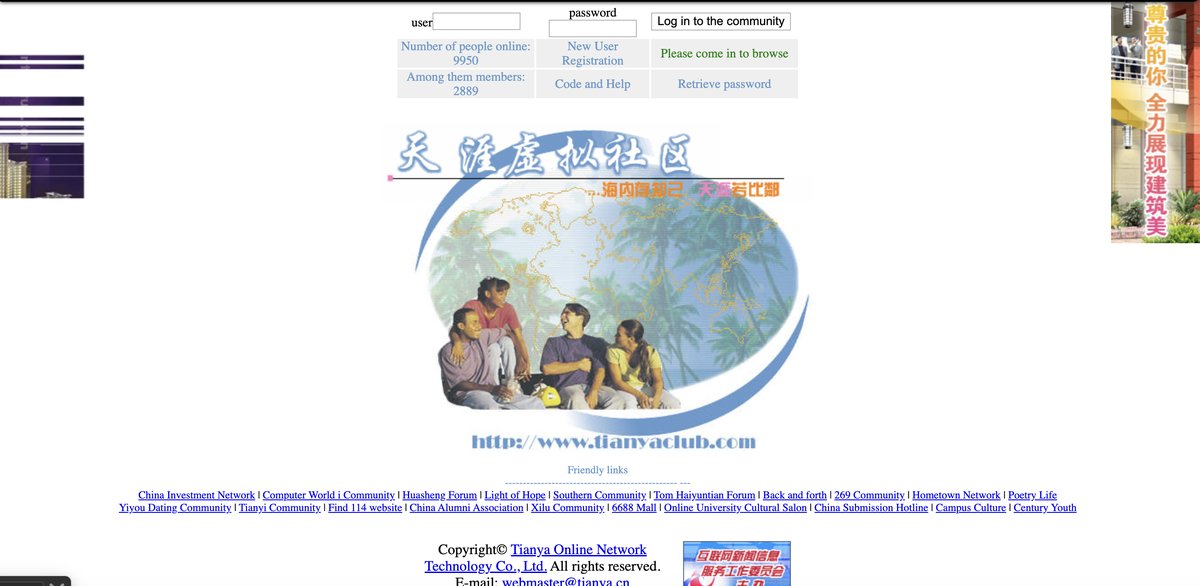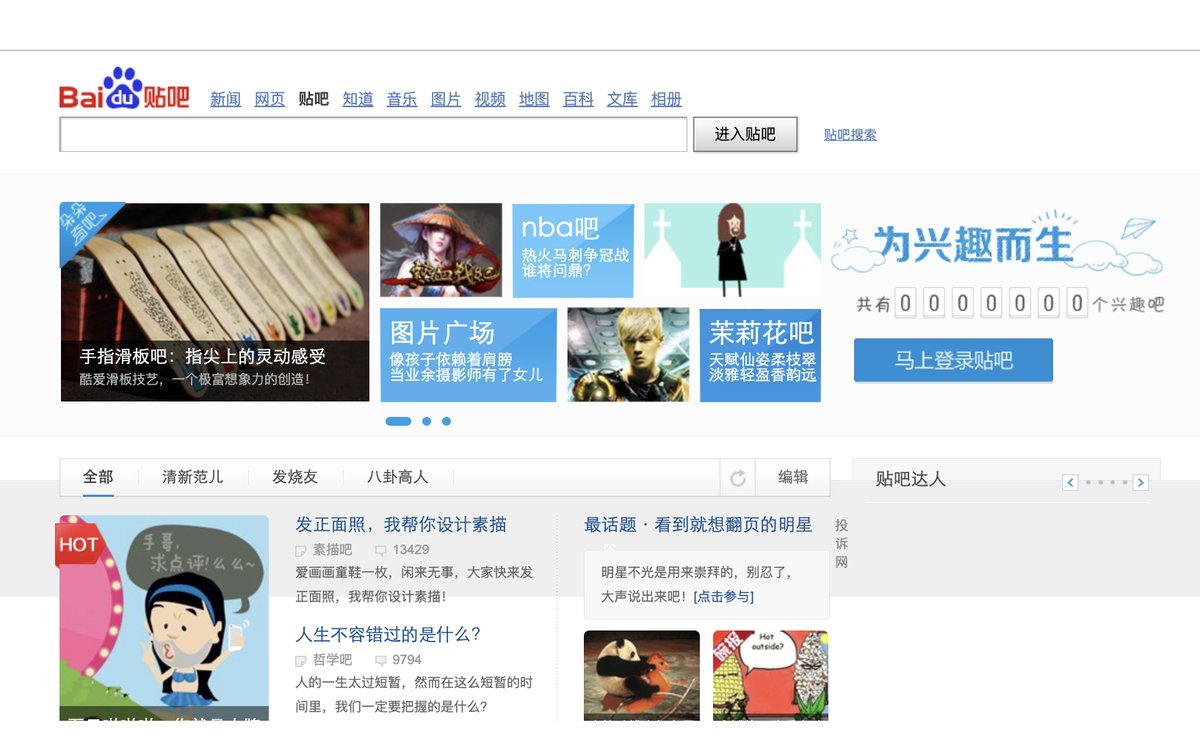With the rise of short video, some of China’s earliest social media platforms have reached the end of their journey, with a few even transforming into a hub for misogynistic content
Liu Minqiao (pseudonym) has been in a state of mourning for the past few months—not for a lost loved one, but rather for the passing of a steadfast companion of hers for the past two decades: Tianya, once China’s earliest and largest online forum.
She didn’t give it too much thought when she first started having trouble loading the site in late April. Assuming it was either an internet glitch on her end or simply a routine episode of maintenance, she carried on with her everyday life working in the pharmaceutical industry in Canada. It was only days later that Liu saw the news confirming the website’s official shutdown on April 25 due to financial troubles, leaving its future prospects shrouded in uncertainty.
After the initial shock, Liu entered the first stage of grief—denial. “For someone like me, a Tianya veteran of 20 years, it’s not just a website anymore. It’s like a family member to me. You can accept your parents being elderly and frail, but you can never be okay with them suddenly dropping dead, right?” says Liu, now in her 40s.
Liu is not alone. The closure of the site triggered waves of nostalgia among netizens, especially those born in the 1970s and 80s. A hashtag related to the event has now garnered over 10 million views on the Chinese Twitter-like social media site Weibo.
This is also not the first time Chinese netizens have mourned the passing of a once-popular social media platform, especially those in the form of BBS (Bulletin Board Systems) for text-based discussions and information sharing, and reminisced about the early years of the Chinese internet.
Maopu, an entertainment news-focused BBS platform founded in 1997 and the birthplace of multiple viral internet memes, disabled its new post function in April 2021, putting the website into eternal sleep mode. Renren Network, popular mostly among university students, was dubbed China’s Facebook when it launched in 2005. After failing to attract users outside of college campuses, the platform was eventually sold to a technology-focused media group in 2018 by its founder, becoming a relic of the past for most netizens. Baidu Tieba, which once proudly proclaimed itself as the “world’s largest Chinese online community” with over 300 million monthly active users at its peak, had lost 90 percent of them by 2021, 18 years after it was founded. Tianya’s unfortunate closure is not unique, but an exemplary tale of a platform that couldn’t keep pace with the rapidly evolving internet landscape in China.
Founded on South China’s Hainan Island in 1999, Tianya, which directly translates to “the ends of the sky,” first started as a stock forum used mostly by trading enthusiasts. As the internet was still a novelty reserved for those with higher social status and more disposable income, the site quickly evolved into a platform for open discussions on various subjects, including sensitive social, economic, and political topics. With the goal of becoming the “Online Sanctuary for the Global Chinese Community,” Tianya has since amassed 130 million registered users worldwide, and by 2019, as per its official website, its reach had extended to 250 million people monthly.
Tianya was Liu’s window to the world beyond her hometown. Born in the 1970s in Hubei province, Liu is part of China’s first wave of wangmin (网民, “netizens”) and home computer owners after the country officially connected to the World Wide Web in 1994. She discovered Tianya in 2001 and was immediately hooked.
“Tianya was like a whole new world to me. All the posts were well-versed with strong opinions; I could learn something from each and every one of them on the site,” Liu tells TWOC. “The first batch of Chinese netizens were mostly highly educated and well-mannered, unlike now where everyone can have an opinion online. The user experience on these platforms was so much better then.”
Surfing the web could get very expensive in the late ’90s and early 2000s. Personal computers were still a luxury at the time. A 486 computer, the most advanced model in 1995, cost over 9,000 yuan, almost double the average annual salary at the time. With personal PCs out of reach for most people, the internet cafe, or wangba, was a popular yet still pricy alternative. The first internet cafe opened in Shanghai in 1996 and charged around 40 yuan per hour. The average monthly income at the time was around 500 yuan.
Liu can’t recall the exact cost of going online on her home PC, but she remembers it being charged by the minute and quite expensive too. “To save on internet fees, I used to open a webpage, immediately disconnect the internet, read the content of the page, and then reconnect to the internet to refresh the next page,” says Liu.
Still, Liu was so fascinated with her new discovery that she used to spend three to four hours a day on Tianya. She can’t pinpoint exactly what attracted her to Tianya. To her, the website is like an all-encompassing universe. The platform fostered an environment of inclusivity, accommodating diverse opinions. Many published authors began their careers by writing novels on Tianya, including Tianxiabachang, whose Ghost Blows Out the Light series boasts billions of readers and has been adapted into multiple TV series and movies. Lots of posts on China’s stock and real estate market have proven to be somewhat prophetic. For instance, in a now inaccessible 2010 post, the author predicted 13 stages of development for China’s housing market. More than half of them have become a reality.
Liu used to visit Tianya every day. Even after she moved to Canada a few years ago, she continued to visit the site every three to five days until its closure this year, giving her a front-row seat to witness how her sacred ground lost its charm over the years.
“Even those born in the ’90s hardly know or use the site. It failed to attract the younger generation and the emerging markets. Relying solely on the intellectual market from our generation can’t sustain continuous growth,” says Liu.
With the rise of microblogging sites like Weibo and short video platforms like Douyin (China’s TikTok), users’ attention spans have grown shorter and shorter. Platforms that heavily feature long-form articles and discussion threads like Tianya become less appealing to younger users. Tightened censorship also limited free discussion on certain topics that used to draw users to the platform.
Yuyu, a former Tianya employee, echoes that sentiment. “From posts to images, then to videos, and finally to live streaming, the industry has gone through many iterations. But Tianya is still the same,” she tells TWOC.
A Hainan local, Yuyu got her first job out of college as a community operations manager at Tianya in 2005. Her job was easy, mostly managing and overseeing conversations on the forum, leaving her more time and freedom to learn other skills like Photoshop and coding. She was later promoted to the product management and operations team, working on projects in collaboration with Google, Tianya’s strategic partner at the time.
“Tianya laid the foundation for my understanding of community operation and provided valuable insights for my later work,” says Yuyu.
Yuyu left the company in 2007 and moved on to other internet companies, including e-commerce giant Alibaba. She eventually retired from the industry and opened her own online jewelry store in 2018. Even though her later jobs paid much better than the 1,200 yuan monthly salary at Tianya, she still misses her time there after all these years.
“[Other companies] can be very demanding. They push people to their limits. But Tianya was chill. You could do whatever you want and hang out with your coworkers after you clocked out,” Yuyu reminisces.
However, she admits that the lack of rules in management probably also contributed to the website’s demise.
“I had to find things to do on my own. Even my supervisor wasn’t sure what I needed to do. Looking back now, it seems that most people lacked goal-oriented management,” she adds.
Yuyu still keeps in touch with her old colleagues at Tianya through WeChat. They had gotten wind of the company’s cash crunch way before the website shut down in April. The company is now 200 million yuan in debt, with more than 10 million owed to its server provider, China Telecom, Tianya’s founder Xing Ming told state-owned newspaper Beijing Youth Daily. Chinese tech media Leiphone also reported that many employees have left the company due to unpaid wages and social security funds. Tianya, with nearly a thousand employees at its peak, now has only a little over 20 remaining.
The platform organized a seven-day livestreaming event on Douyin in June after its closure went viral on Weibo. They aimed to raise 3 million yuan through crowdfunding to restart the server at the very least. However, due to the team’s inexperience in livestreaming, they didn’t even reach one-tenth of their initial goal.
“They didn’t do a good job promoting the event. I didn’t know about it until it was over. Although Douyin is a major player in short videos, it doesn’t overlap much with Tianya’s audience,” says Liu.
Yuyu is also not optimistic about the possibility of reviving Tianya.
“I watched one of the livestream sessions between the founder, Xing Ming, and investors. He still doesn’t have a clear vision for the site. He wants Tianya to be the largest online Chinese community in the world, but he’s not clear on what that entails,” she sighs.
Though Tianya’s future remains uncertain, it is remembered by most netizens as a place for insightful discussion. Many who saved Tianya’s most popular posts and discussions are now selling them online for a price, giving people unfamiliar with the site a glimpse into its most glorious days. A simple search on Taobao, one of the largest ecommerce platforms in China, reveals thousands of stores selling the digital backup of those posts, with some shops boasting over 4,000 monthly sales.
However, the same cannot be said for its former competitor, Baidu Tieba. Although Tieba is still live and running, its reputation has been dragged to the ground, with the platform now flooded with ads and misogynistic content.
Launched with the slogan “born out of passion” in 2003, Tieba created online forums called bars, or ba (吧), covering a wide range of topics from gaming to exam prep. The platform soon gained popularity among young people for its celebrity content.
Amber Yang (pseudonym), a 28-year-old warehouse manager in Guangdong province, was addicted to Tieba’s tabloid-like posts when she first discovered the platform in 2014. She had just finished the highly stressful college entrance exam, or gaokao, and suddenly found herself with a lot of free time. Tieba filled that void. She used to spend hours every day on the platform, reading through all the new posts in a “bar” dedicated to Chinese celebrities called yulequan, or “showbiz.” Sometimes she would take the initiative and create posts praising the actresses she loved or commenting on the latest streetwear worn by the stars.
“My posts used to get a lot of traffic. Oftentimes, they received more than 300 replies,” recalls Yang.
In 2015, Tieba had over 300 million monthly active users. However, the surge in traffic during that time also created a somewhat chaotic ecosystem. In an effort to enhance the community’s environment, Baidu chose a straightforward yet aggressive approach to manage the flow of activity: deleting posts on heavily debated issues and temporarily closing some sections. At the same time, Baidu was also eager to increase revenue generation from Tieba, resulting in advertisements flooding the platform.
Yang stopped using Tieba in 2017 after she graduated from college. With a lot of celebrity content migrating to other emerging platforms like Weibo, Yang sees no reason to go back there again.
“I logged back into my old account last month just to reminisce about my college days. I found that the environment on Tieba has become really hostile, especially towards women,” she complains.
One of the bars that remains active to this day is Sun Xiaochuan Bar. Named after a popular video game streamer, it has become a discarded corner of the web where misogynistic content and discussions prevail. Xiao Yi (pseudonym), a 22-year-old college student in Hangzhou, has learned firsthand how things can spiral out of control in these places.
Xiao is not an active user of Tieba. Instead, she likes to share photos of her outfits on the popular lifestyle site Xiaohongshu, “China’s Instagram” with predominantly female users. On June 13, she posted a photo of herself in a slightly ripped, tight gray top with the caption, “The male gaze is really annoying.” She went on to complain about how some middle-aged men stared and even took photos of her and her friends wearing sexy clothing when they were out shopping that day.
The comments section was initially just girls sharing similar experiences until a day later when insults and swear words started pouring in. One of her followers messaged her and told her that someone took a screenshot of her post and reposted it on Tieba. The thread on Tieba has received more than 700 replies, most of them slut-shaming her or mocking her appearance. Some even Photoshopped her photo into explicit content.
Xiao had heard stories like this before as some state-owned media like Southern Weekly have covered similar incidents. However, she never thought it could happen to her. Shocked and frightened, Xiao immediately contacted the post’s creator and the forum’s manager, urging them to remove the post and issue an apology to her. She received no response for days while hundreds of name-calling private messages flooded her inbox on Xiaohongshu.
Finally, she decided to share her experience on Xiaohongshu, seeking assistance from fellow netizens on her next steps. One of her followers soon found the person who posted the photo to Tieba as he used the same handle for all online platforms. He turns out to be one of Xiao’s earliest followers. Following a barrage of messages from Xiao’s female fans, he deleted the post and reluctantly extended a half-hearted apology to Xiao. He insisted that he didn’t do the name-calling himself; therefore, a public apology on Tieba was unnecessary.
“He started ghosting me after that. I was so disgusted by the whole thing, I decided to call the police,” she tells TWOC.
However, Xiao was told by the police that this falls outside of their jurisdiction as they don’t know his real identity. The police suggested that she file a defamation suit against the platform so they could provide the personal information of the user.
After consulting with a lawyer, she, along with another girl who had a similar experience, filed a lawsuit against Tieba on July 18. They’re now waiting for the court to hold a hearing, which could take months according to her lawyer. She has already spent more than 3,000 yuan on legal fees in one short month, but she is not too hopeful for the outcome.
“Best case scenario: we find the guy, he issues a public apology, and covers my legal fees. But that could take a really long time,” she explains. “But I still want to go through with it. I’ve received so much kindness and support from my followers on Xiaohongshu, I want to prove to them that there are ways to fight back. I will continue to share my journey on Xiaohongshu and maybe others won’t feel too helpless if something like this happens to them too.”
Tieba has not responded to TWOC’s request for comment at the time of writing.
According to a report from the state news agency Xinhua published in June 2023, China now boasts over 1 billion internet users. With more and more people gaining access to cyberspace, new platforms and apps are constantly emerging, vying for our attention each day. Despite calls from a few loyal users, the prospects for the revival of these early platforms continue to diminish. They now serve more as a cautionary tale about stagnation.
There is no way of knowing what China’s future online landscape will look like. Perhaps in 20 years, we will all be reminiscing about the immense joy the Douyin dancers had brought us while it lasted.
The Rise and Fall of China’s OG Social Media Platforms is a story from our issue, “Online Odyssey.” To read the entire issue, become a subscriber and receive the full magazine.

















